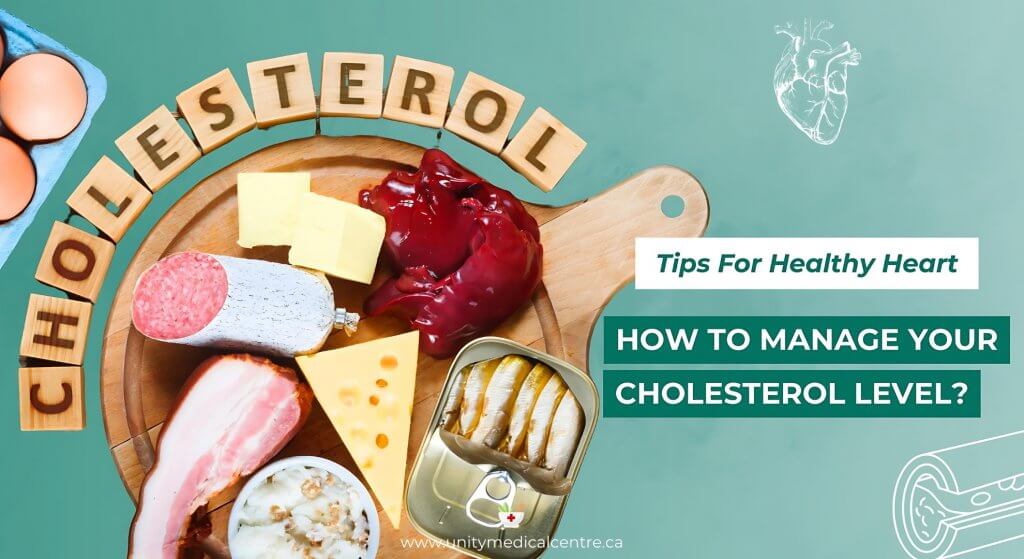
How to Manage Your Cholesterol Level?
Introduction
Cholesterol management plays a pivotal role in maintaining heart health, yet many individuals grapple with understanding what cholesterol is and how to effectively manage it. In this comprehensive guide, we’ll explore more about how to manage cholesterol levels, know the different types of cholesterol, identify foods that contain beneficial cholesterol, and outline effective strategies for managing cholesterol levels to promote heart health. By empowering individuals with knowledge and practical tools, we aim to foster a proactive approach to cholesterol management and reduce the risk of cardiovascular disease.
Understanding Cholesterol:
Cholesterol, a waxy, fat-like substance produced by the liver and obtained from dietary sources, serves as a building block for cell membranes and plays a crucial role in hormone synthesis and vitamin D production.
Is Cholesterol Bad For You?
Cholesterol itself is not inherently “bad” for health; in fact, it’s an essential substance required by the body to build cell membranes, produce hormones (such as estrogen and testosterone), and synthesize vitamin D. However, problems arise when cholesterol levels become imbalanced, leading to health issues.
Types of Cholesterol:
There Are Two Main Types Of Cholesterol:
Low-Density Lipoprotein (LDL) cholesterol: Often referred to as “bad” cholesterol, high levels of LDL cholesterol can lead to the buildup of plaque in the arteries, increasing the risk of atherosclerosis (hardening and narrowing of the arteries) and cardiovascular disease.
High-Density Lipoprotein (HDL) cholesterol: Known as “good” cholesterol, HDL cholesterol helps remove LDL cholesterol from the bloodstream and transport it to the liver for excretion, thus reducing the risk of heart disease.
Managing Cholesterol Levels:
Adopting lifestyle interventions can significantly impact cholesterol levels and reduce the risk of cardiovascular disease. Engaging in regular physical activity, such as aerobic exercises like brisk walking, jogging, or cycling, can help raise HDL cholesterol levels and improve overall cardiovascular fitness. Aim for at least 150 minutes of moderate-intensity exercise per week, supplemented with strength training exercises to further enhance heart health. Smoking cessation and limiting alcohol intake are also crucial components of cholesterol management, as both tobacco smoke and excessive alcohol consumption can adversely affect cholesterol levels and contribute to heart disease risk.
For more tips about lifestyle modification, Read this article: https://unitymedicalcentre.ca/small-shifts-big-impact-how-healthy-lifestyle-choices-shape-your-chronic-disease-risk/
Eating a heart-healthy diet rich in foods that promote beneficial cholesterol levels is paramount for maintaining optimal cardiovascular health. Incorporating omega-3 fatty acids, found abundantly in fatty fish such as salmon, mackerel, and trout, can help increase HDL cholesterol levels and reduce triglycerides, a type of fat associated with heart disease. Additionally, flaxseeds, chia seeds, and walnuts are excellent sources of alpha-linolenic acid (ALA), a plant-based omega-3 fatty acid that supports heart health. Olive oil, renowned for its monounsaturated fat content, has been shown to raise HDL cholesterol levels while lowering LDL cholesterol levels, making it a staple in heart-healthy cuisine.
Medication Management:
In cases where lifestyle modifications alone are insufficient to achieve optimal cholesterol levels, healthcare providers may prescribe medications to help manage cholesterol levels and reduce the risk of cardiovascular events. Statins, a class of drugs that inhibit cholesterol synthesis in the liver, are among the most commonly prescribed medications for lowering LDL cholesterol levels. Additionally, other medications, such as bile acid sequestrants, fibrates, and PCSK9 inhibitors, may be prescribed based on individual patient needs and risk factors. It’s essential to work closely with a healthcare provider to determine the most appropriate treatment plan tailored to individual health goals and preferences.
Conclusion:
Diet and lifestyle factors play a significant role in cholesterol levels. A diet high in saturated and trans fats, as well as excessive consumption of cholesterol- rich foods (such as red meat, full-fat dairy products, and fried foods), can raise LDL cholesterol levels. Alternatively, consuming a diet rich in fruits, vegetables, whole grains, and healthy fats (such as those found in nuts, seeds, avocados, and olive oil) can help lower LDL cholesterol and raise HDL cholesterol levels. Whatever you consume, do it consciously and remember balance is critical.
References
- National Heart, Lung, and Blood Institute. (n.d.). High Blood Cholesterol: What You Need to Know. https://www.nhlbi.nih.gov/health-topics/high-blood-cholesterol
- Mayo Clinic. (2021). Cholesterol: Top Foods to Improve Your Numbers. https://www.mayoclinic.org/diseases-conditions/high-blood-cholesterol/in-depth/cholesterol/ART-20045192
- American Heart Association. (2021). How To Get Your Cholesterol Tested. https://www.heart.org/en/health-topics/cholesterol/how-to-get-your-cholesterol-tested
- Harvard Health Publishing. (2019). 11 Foods That Lower Cholesterol. https://www.health.harvard.edu/heart-health/11-foods-that-lower-cholesterol
Related posts:
- 10 Lifestyle Tips for Chronic Disease Prevention
- Small Shifts, Big Impact: How Lifestyle Choices Shape Your Chronic Disease Risk
- Lingering Cough: Understanding, Treatment, and Prevention
- Chronic Pain Management: The Role of Holistic Medicine in Chronic Pain Relief
- Understanding Different Types of Chronic Pain
